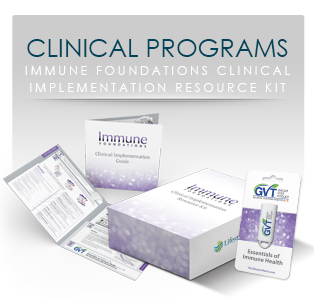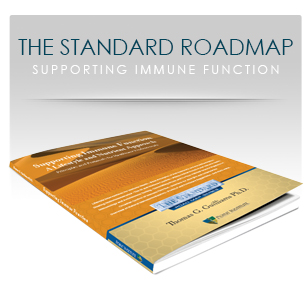Dr. Fasano identified the intimate, essential role that the gut plays in the development of autoimmunity. First, Fasano introduced us to the protein zonulin, which, along with a few other regulatory proteins, is directly involved in managing GI barrier homeostasis. At higher amounts, zonulin is a key player in creating pathologic intestinal permeability. Higher amounts of zonulin come when the GI tract is exposed to damaging environmental agents such as gluten.
Once the barrier is compromised, the gluten (or any other food protein or additive, microbe or microbial debris, toxins) can be introduced to the immune system just beyond the gut wall. Indeed, the bulk of our immune system resides here, and its primary role is permitting or denying entry of any exogenous compound. If a damaging compound gains entry, a complex, systemic immune response is generated commensurate with the level of alarm of the offending agent. (i.e., a high level of alarm occurs when gluten is introduced in the gut of a celiac patient).
Dr. Fasano identified what he termed a “triad” of factors required for the development of celiac disease and other autoimmune conditions: genetic predisposition, exposure to offending triggering agent(s), and gut permeability. Taken together, this triad can initiate and propagate autoimmunity and allergic diseases, plus a wide variety of less-expected conditions, including autism, Parkinson’s disease, cardiovascular disease and many others.
Dr. Fasano also posited a fourth, equally important variable that could dictate whether—or when—an autoimmune disease expresses: the gut microbiome. The microbiome, if balanced, can keep the development of autoimmunity in check, even when genetic predisposition is strong. Fasano cites the common example that some individuals don’t develop full-blown celiac disease until much later in life, ostensibly when sufficient damage to the gut microbiome has taken place. Further, other research has long documented the influence of specific microorganisms that trigger the onset of autoimmunity in a genetically susceptible individual via molecular mimicry, from the association of P. mirabilus or P. gingivalis (of the oral microbiome) and rheumatoid arthritis, to Yersinia enterocolitica and Hashimoto’s thyroiditis.
Understanding the fundamental pathology of autoimmunity provides great insight into our clinical approach to care. In my practice, if I’m treating someone for an autoimmune or allergic disease, I always consider the gut. Indeed, in this patient population, I assume there is some degree of pathological intestinal permeability and microbial imbalance, plus offending triggering agent(s) such as foods, toxins and microbes that need to be identified and removed. I also know there are likely other, secondary mediating factors that additionally propagate inflammation, because once intestinal permeability occurs, bystander foods, organisms, toxins, medications, a high-stress lifestyle, etc. can further propel the inflammatory cascade and contribute to the disease process.
A careful history is essential for the autoimmune/allergic patient, including family and childhood medical history, GI function and childhood illnesses, environmental exposures (including vaccine/vaccine response history, toxins, molds, etc.), diet, stress experiences and stress management and medications, physical activity, oral hygiene. Adult history should likewise be thorough. I use a fairly long and involved intake form, modified from the IFM’s Adult (or pediatric) Medical Questionnaire, in addition to a diet diary and medical symptom questionnaire. I always request past medical records for at least a year, including laboratory data.
A physical exam reflective of the findings in the history will provide additional, valuable clues. In addition to an abdominal exam and gastrointestinal evaluation, the skin can be particularly revealing. Acne, rosacea and eczema, all suggest GI imbalance. The oral cavity should be examined for signs of inflammation. Finally, I always include a nutrition physical exam. Learn more about what I’m doing on my website, or turn to the Nsight NPE recordings on the IFM website.
For the autoimmune/allergic patient, I recommend the following laboratory considerations. Autoantibody testing is essential if recent labs are not available, or autoimmunity has not yet been diagnosed. Some combination of inflammatory markers including hsCRP, ESR and/or cytokines such as IL-6, IL-17, TNF-alpha, IFN-gamma are important. In the allergy patient, consider a full IgE environmental and/or food panel, as their history dictates, plus histamine and tryptase as indicated. For “specialty” labs, I obtain a comprehensive stool test on virtually all patients. For many, I obtain sex hormones, thyroid function, iron, IgG foods and broad nutrient testing, including vitamin D and minerals.
Once laboratory data are received, combined with your clinical observations, you will likely (in my experience) start your treatment by addressing GI imbalances first. If there are other, significant findings (such as untreated hypothyroidism, or a profound nutrient depletion), address those concurrently to GI imbalances. A smart, straightforward GI plan is the “4/5 R” protocol, employed for decades by integrative and functional doctors around the globe.
 | About Dr. Kara Fitzgerald Dr. Fitzgerald received her doctorate of naturopathic medicine from National College of Natural Medicine in Portland, Oregon. She completed the first CNME-accredited post-doctorate position in nutritional biochemistry and laboratory science at Metametrix (now Genova) Clinical Laboratory under the direction of Richard Lord, Ph.D. Her residency was completed at Progressive Medical Center, a large, integrative medical practice in Atlanta, Georgia. Dr. Fitzgerald is lead author and editor of Case Studies in Integrative and Functional Medicine, a contributing author to Laboratory Evaluations for Integrative and Functional Medicine and the Institute for Functional Medicine’s updated Textbook for Functional Medicine. She has been published in numerous peer-reviewed journals. Dr. Fitzgerald is on faculty at the Institute for Functional Medicine, and is an Institute for Functional Medicine Certified Practitioner. She was formerly on faculty at University of Bridgeport in the School of Human Nutrition and the School of Naturopathic Medicine. She is a clinician researcher for The Institute for Therapeutic Discovery. Dr. Fitzgerald regularly lectures internationally for several organizations and is in private practice in Sandy Hook, Connecticut. Learn More About Dr. Fitzgerald at .www.drkarafitzgerald.com. | |
 |  |  |
| Learn More | Learn More | Learn More |




